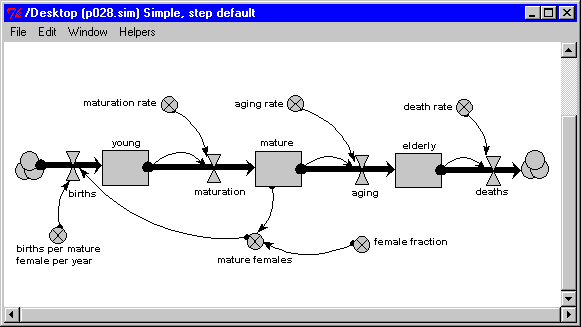Main menu
You are here
Model entry
| Search | Simulistics | Model catalogue | Listed by keyword | Listed by ID | Listed by title | Listed by date added |
Population dynamics: single species: age class: separate compartments
Model : popdyn2
Simile version : 3.1+
Date added : 2003-06-20
Keywords :
Population dynamics ;
Age-class modelling ;
Disaggregated population ;
Single-species population dynamics ;
Description
This models the dynamics of a population divided into three age classes: young, mature and elderly. Each age class is represented by a single compartment, whose value is the number of individuals in that class.
The flows between the age classes represent the ageing process: the movement of individuals from one class to the next as the grow older. The flows into the first age class represents reproduction. This depends on the number of mature females, which is a fraction of the number of mature individuals. The flow out of the third age class represents mortality: in this model, we assume that only the old individuals die.
Simple proportional relationships are used for all flows:
- a certain proportion of each class age each year;
- a certain proportion of the females reproduce each year;
- a certain proprtion of the elderly individuals die each year.
The model uses a time step of 1 year.
Source: Andrew Ford (1999): Modelling the Environment, p.28
Files
Model fileClick on the icon to download the model file. (You will need Simile to examine and run the model. A free evaluation version is available from the products page.) Some browsers may attempt to display the model file, rather than open it in Simile; in this case, use the browser back button to return to this page, and use the context menu (invoked by right-clicking on the link) to save the target file to disk. |
|
|
|
|
Diagram

Equations
Compartments: elderly Initial value = 20 Rate of change = aging - deaths Comments: Number of elderly, millions mature Initial value = 30 Rate of change = maturation - aging Comments: Number of mature, millions young Initial value = 50 Rate of change = births - maturation Comments: Number of young, millions Flows: aging = aging_rate*mature Comments: Number maturing, millions per year births = births_per_mature_female_per_year*mature_females Comments: Births, millions per year deaths = death_rate*elderly Comments: Number dying, millions per maturation = maturation_rate*young Comments: Number maturing, millions per year Variables: mature females = female_fraction*mature Comments: Number of mature females, millions Parameters: aging rate = 0.1 Comments: Proportion aging, per year births per mature female per year = 0.5 Comments: Number of births per female per year death rate = 0.2 Comments: Proportion dying, per year female fraction = 0.5 Comments: Proportion of females in the population maturation rate = 0.1 Comments: Proportion of young maturing, per year
Results
|

References
Ford, A (1999) Modeling the Environment.
Island Press. p.28
Copyright 2003-2024 Simulistics Ltd
